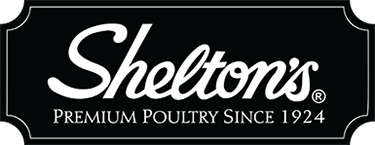Ethics
At Shelton’s, Our Chickens and Turkeys Don’t Do Drugs™
During the 1980’s, Shelton’s took the initiative to make three important changes in our growing practices. First we reduced the number of chicken and turkeys that were crammed inside of the growing spaces. This reduced the likelihood of disease. Think about it, more space equaled healthier, happier birds. It just seemed right. This led to helping define the protocols for Free Range, which by definition means ‘to have access to the outdoors’.
Secondly we removed any sort of artificial growth stimulant. Artificial growth stimulants take many forms. Some used in poultry feed are called Arsenicals, a derivative of Arsenic; a poison. This Poison causes the stomach lining of the animal to become irritated and mimic hunger, causing the birds to eat more and constantly, thus putting on more weight and getting to market faster.
Finally we eliminated the antibiotics in their feed, which on the face seems easy to do, but was quite a struggle for the feed providers. It turns out that Antibiotics in animal feed are typically fed at sub therapeutic levels, meaning that they’re not given enough to do any good in fighting a disease but at lower amount do increase the amount of water weight gain the birds experience, thus increasing the weight of the birds and getting them to market faster, or simply put, another growth stimulant.
We’re proud of our pioneering efforts to raise poultry in a humane and sustainable way. Something we continue today.


